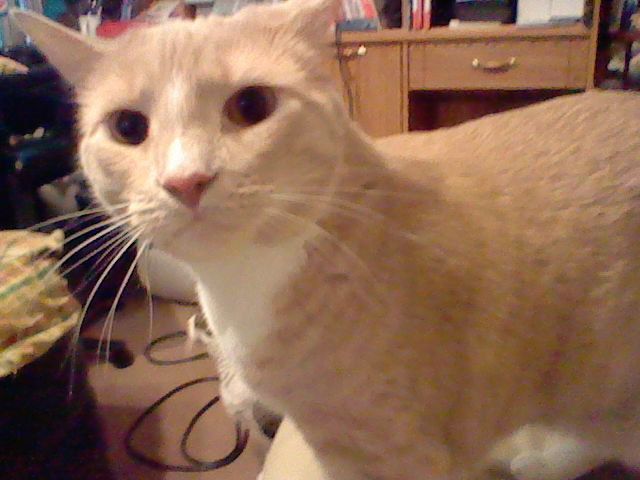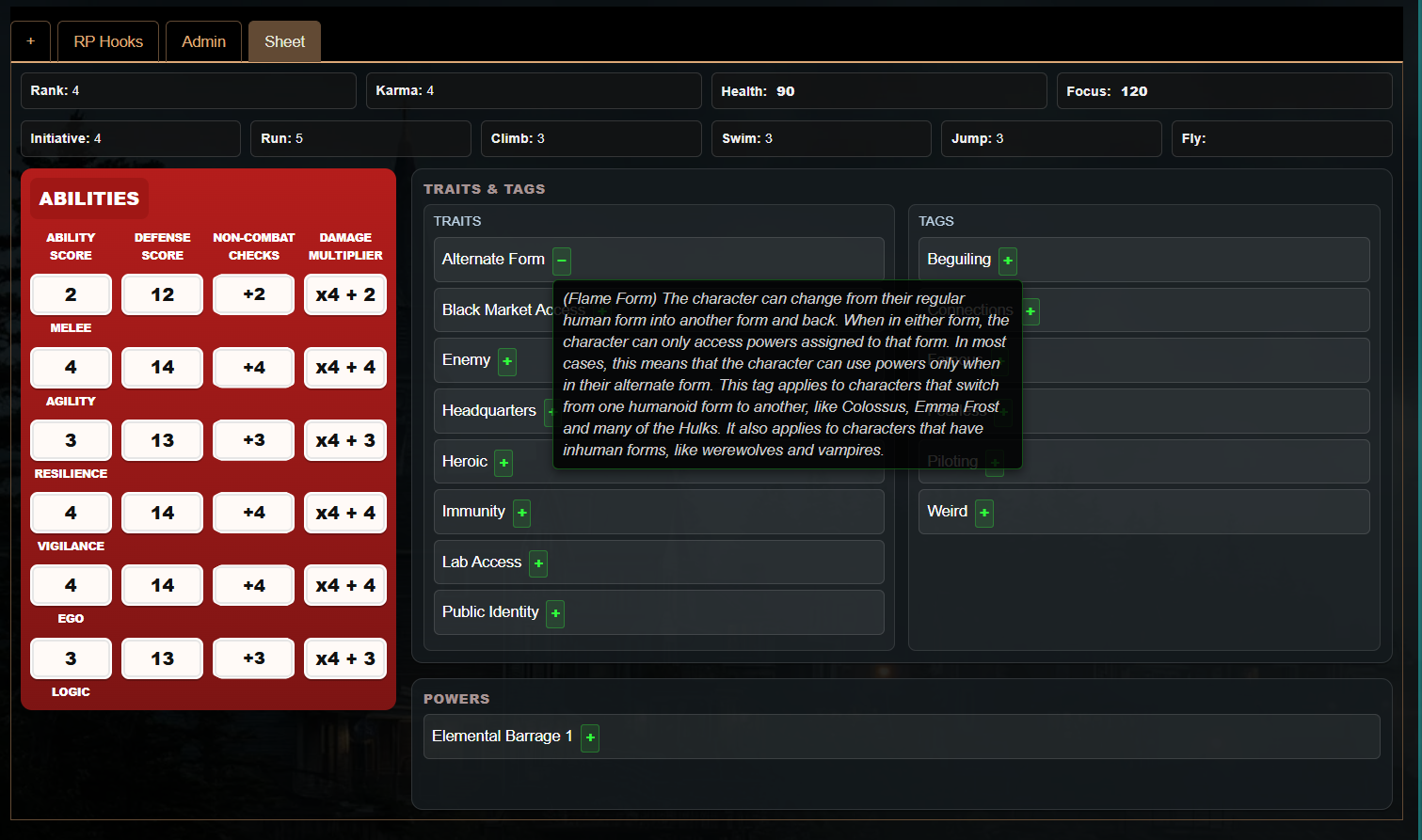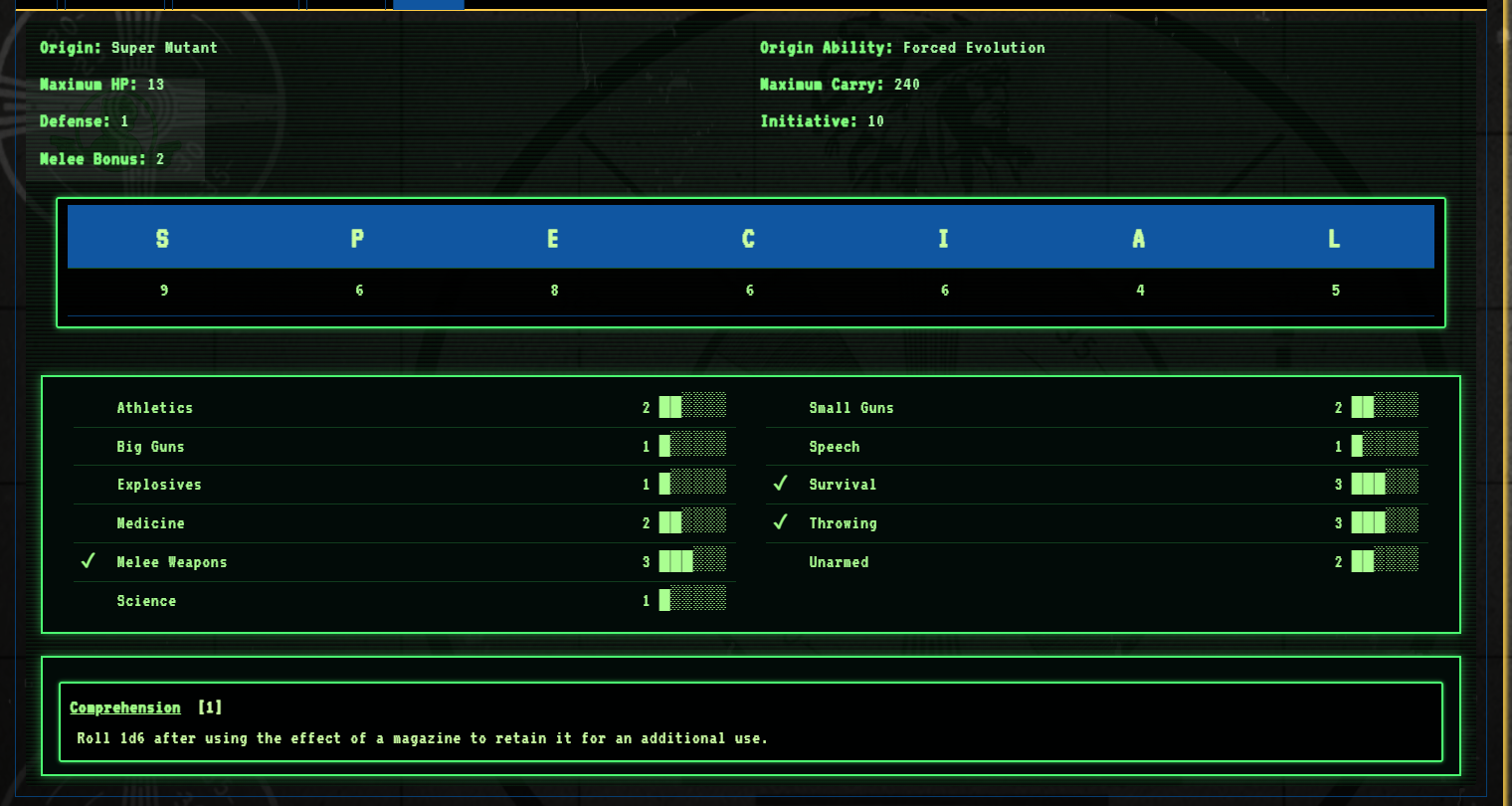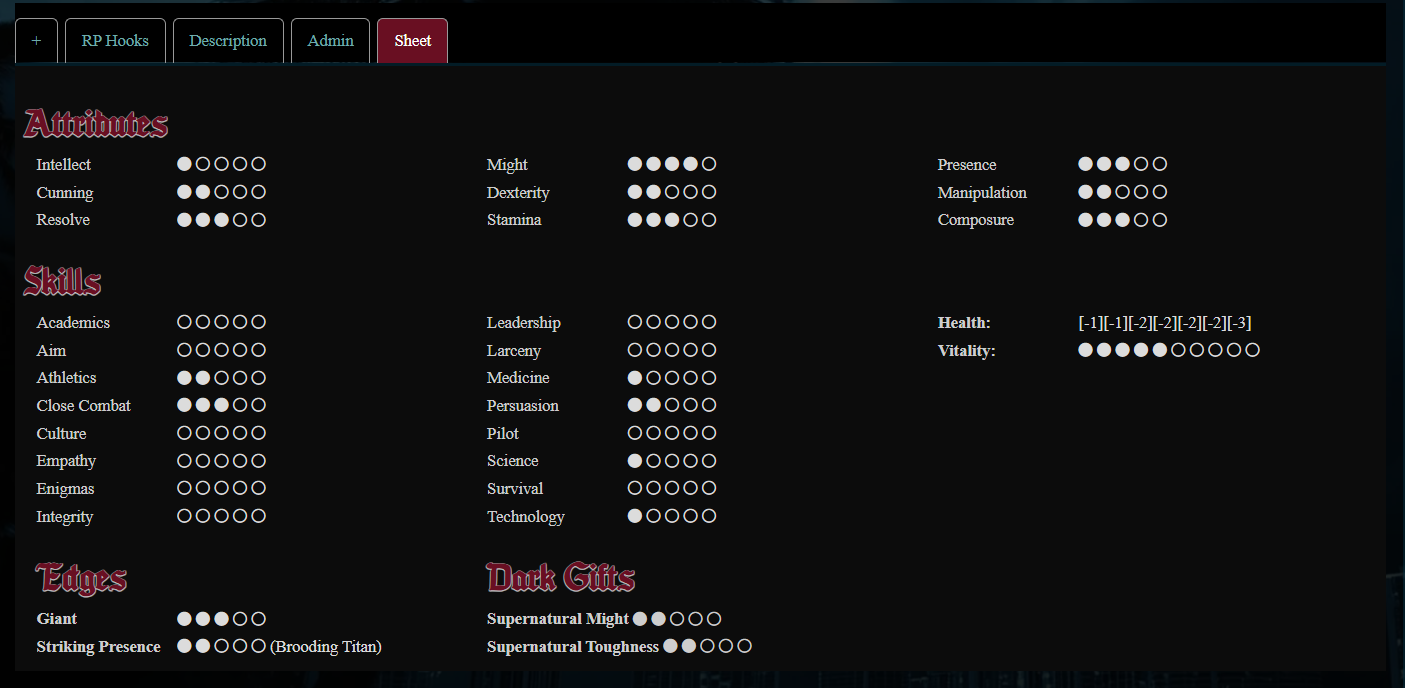My cat, Veronica Mars, passed away Monday night. She was my special little girl for 17 years. My wife and I are devastated. There are no words to express how much we’re going to miss her.

My cat, Veronica Mars, passed away Monday night. She was my special little girl for 17 years. My wife and I are devastated. There are no words to express how much we’re going to miss her.

Not really anything about an actual game. I’ve just been laid up dealing with some health issues, and, for some reason, I find fighting with code relaxing. While I’ve been recovering, I wanted to see if I could do a web-based character generation and sheet for the Marvel Multiverse RPG in Ares. I’m pretty proud of it. It’s not 100% done but it’s in the final stretch, I think.
Not sure what, if anything, I’ll do with it. Just wanted to see if I could.

It seems I code more than I RP anywhere, which makes me sad, BUT my group challenged me to see if I could do the Fallout 2D20 RPG for Ares. I think it came out pretty good. Sharing here because no one else I know would be interested or care. LOL 

@Faraday For me, it combines aspects of several mediums into one. Specifically, I’m referring to Ares though most of this applies to other MUSH/X platforms.
A centralized, persistent world where characters and RP are organized in one place, making it easy to find people and opportunities.
Ways to create both public and private scenes that can later be easily shared and logged - keeping track of all the collaborative storytelling.
Character profile pages with lots of character information including demographics, backgrounds, sheets, and galleries - all connected to the game world.
Integrated dice rolls for games that use RPG systems, without breaking the flow.
Easy integration with Discord for OOC communication while keeping IC stuff in the MUSH.
Being able to save RP logs to build world and character history.
Those are the big reasons why I prefer MU*s to other forms of online RP. I’ve tried forum RP and discord RP extensively and it just doesn’t hit the same for me. There’s something special about logging into a persistent world where everything you need for good roleplay exists in one connected space.
Looking for feedback on a potential game.
2024 was rough for me, and I’m aiming to make 2025 better by getting back into the MU gaming scene as a GM. While reviewing potential themes, I’ve noticed some of my favorites (particularly Star Trek) might have limited player appeal.
I’ve been considering combining modern Gothic horror with the Storypath System. Think World of Darkness/Chronicles of Darkness style gameplay, but without the associated complexities. It would offer a familiar theme with a fresh mechanical approach.
I’m planning to host this on Ares since traditional MU environments don’t fit my schedule anymore - can’t commit to those lengthy single-session RPs these days. The good news is I’ve already implemented character generation through the web portal. The core mechanics are in place; we just need to develop specific Edges and powers.
One of Storypath’s strengths is its flexibility. Converting WoD/CoD abilities should be straightforward, and we could easily create custom powers too. This would give players extensive character creation options.
The setting and some theme elements are still in development. I’m mainly wondering if this concept would interest people? All the Storypath System information would be readily available on the wiki.
Would love to hear your thoughts or suggestions!
I often struggle on “older” games because there just aren’t many ways for new players to find RP with the established crowd. Cliques have formed, RP circles have popped up, storylines are already rolling…and I find myself stuck trying to break in. I’ll make a character, maybe do one or two random “coffee shop scenes,” and then just stop logging in because nothing clicks.
I really dig games that give newbies a natural in with older, more established characters. Star Trek works great (getting assigned to a ship, base, or Starfleet Academy), school-based games too (Hero High, Supernatural University, etc.), and super-hero games (with their teams or those built-in relationships between FCs we can lean on).
I obviously don’t speak for all new players, but I don’t think I’m some special snowflake here. I bet tons of new players hit these same walls. Maybe this is why so many MUSHes fizzle out after a few months - they don’t solve the “new player integration” problem.
AI detectors make me twitch because they don’t actually detect AI. They can’t. What they really do is look for patterns in the writing, like how smooth and predictable it is. Clean sentence structure and sensible word choices. Things like that. Ironically, the better your writing is, the more likely a detector is to call it AI.
My honest suggestion is this: if you think someone is using AI in their poses and you don’t like it, treat it the same way you would any other RP issue. If you don’t enjoy their writing for whatever reason, stop RPing with them. You’re not obligated to RP with anyone.
Posting here helps motivate me so here is the Theme file I just finished for the game. 
Welcome to Dark City, where reality wears a cracked mirror’s smile.
Beneath the fluorescent glare of modern life lies another world—one where ancient horrors have adapted rather than faded. Here, Gothic spires pierce the sky between glass-and-steel towers, their shadows stretching like grasping fingers across urban sprawl. The sun seems perpetually filtered through a veil of gray, as if something vast and unseen drinks its light.
This is a world where monsters have learned to wear designer suits and send emails. Vampires don’t merely lurk in abandoned mansions—they sit on corporate boards and swipe through dating apps seeking their next meal. Ancient fae bloodlines thread through family trees like poison ivy, their gifts manifesting in board rooms and back alleys alike. In forgotten university basements, forbidden sciences mesh with eldritch sorceries, bringing forth abominations that defy both natural law and modern medicine.
Hell itself has gone digital. Demons no longer need to break through—they slip through the cracks in our technology, turning social media into soul markets and smartphone screens into portals of temptation. The old rituals haven’t died; they’ve evolved, finding power in the patterns of modern life.
Every city has its dark reflection here—a twilight realm where gargoyles peer down from art deco facades, where elevated Metrorail tracks cast serpentine shadows that writhe with whispered curses, where gentrified neighborhoods hide covens in coffee shops. Missing person posters fade on rain-slicked walls while security cameras capture glimpses of impossible things. Blood bonds are sealed with electronic signatures, and ancient prophecies are encrypted in blockchain.
This is a world where the old darkness has learned new tricks, where gothic horror wears modern clothes but its heart beats with ancient malice. In Dark City, every shadow holds secrets, every connection conceals betrayal, and every truth masks a deeper deception.
Welcome to the modern gothic. Welcome to a world where the monsters have adapted, but never truly changed. Welcome to Dark City—where the darkness has always been waiting, and it knows your phone number.
Progress is moving forward, even if it’s not as fast as I’d like. I’ve got two alpha testers helping me refine character generation and develop the powers and abilities system.
I wanted to share the setting file I just completed. I chose Miami as our location - I love the contrast between its sunny, vibrant atmosphere and the dark, Gothic elements we’re weaving in. Plus, having watched Dexter, I already knew the city had potential for the kind of atmosphere I’m going for.
Miami in Shadow
Here, the Magic City takes on a darker kind of sorcery. Neon still bleeds across Ocean Drive, but it illuminates gargoyles perched on Art Deco facades, their wings spread against the subtropical night. Palm trees cast serpentine shadows across streets where colonial-era carriages share lanes with gleaming sports cars, and nineteenth-century Gothic spires rise between modern condominiums like dark teeth against the perpetually storm-threatened sky.
This Miami writhes with impossible architecture. A Romanian castle, transported stone by ancient stone, looms over Brickell’s financial district. Venetian-style canals cut through Coral Gables, their waters black as ink under moonlight, while Little Havana’s streets host processions that blend Santeria with rituals far older and darker. In Coconut Grove, Spanish moss drapes from banyan trees like funeral shrouds, concealing paths to places that shouldn’t exist.
The heat remains oppressive, but now it carries the weight of ancient curses. Hurricanes approach the coast like conscious entities, their eyes holding actual malevolence. The Everglades encroach upon the city’s edges with increasing hunger, its waters concealing more than just alligators. On South Beach, beautiful predators stalk through endless nights of pleasure and horror, while in Wynwood, street art writhes with hidden meanings and graffiti spells.
This Miami’s Cuban coffee is served in cups lined with prophetic grounds, and the cafecito windows sometimes open into other realms. Santeros work true magic in back rooms, while demons negotiate souls in Brickell’s glass towers. Luxury boats in the marina belong to creatures that haven’t been human for centuries, and the cruise ships departing from Government Cut sometimes return with none of their passengers—or worse, with all of them changed.
In this Miami, every neighborhood tells a different horror story. Vizcaya isn’t just a museum but a living monument to dark bargains, its gardens maze-like and hungry after sunset. The Metrorail rattles through the darkness like a ghost train, stopping at stations that appear on no official map. Little Haiti thrums with power that makes colonial vampires tremble, while Overtown’s historical wounds birth new monsters from old injustices.
This is Miami seen through an obsidian mirror—where the subtropical heat bakes ancient cobblestones, where Gothic spires pierce a sky heavy with Caribbean storms, and where the city’s famous diversity encompasses creatures from every dark corner of folklore and nightmare. Welcome to Miami, where the darkness dances salsa and the monsters wear guayaberas, where every sunset might be your last, and every Cuban sandwich might be sealed with a blood oath.
The first round of character generation went well. No hiccups. Got some notes that I’ll work on over the next day or so. Looks good, though. I’m pretty pleased. Thought I’d attach an image of what the character sheet looks like via the web portal.

Nowadays, for games I create, I use web-based only. I shy more and more away from the traditional MU shell and more toward web-based for all my RP needs.
Absolutely! I love having my characters struggle and overcome. Social, physical, romantic, whatever. I love drama. IC drama that is. I avoid OOC drama.
Yeah, I can’t say I was psyched ot see it was 5E but it’s not a deal breaker either. It’s weird because we live in a great time for IP-based RPGs(Transformers, GI Joe, Power Rangers, and now Thundercats), but I’m not a huge fan of any of the systems behind them. The exception being Star Trek. I do like the 2D20 system.
@Ashkuri They’ve asked me to help them make images of their characters in Midjourney and I did. Helping them refine their prompt or whatever.
@Ashkuri The general answer is, sometimes. For images, I might if I can’t find an existing image for what I need. If it’s a fictional location or something like that. I’ve helped other people use it for characters and what not as well.
For RP/text, not really. I don’t generate text with it but I might us it to organize my own text. Not for RP but for things that should be clear and concise I might run it through ChatGPT to get advice on how to restructure it.
AI detectors make me twitch because they don’t actually detect AI. They can’t. What they really do is look for patterns in the writing, like how smooth and predictable it is. Clean sentence structure and sensible word choices. Things like that. Ironically, the better your writing is, the more likely a detector is to call it AI.
My honest suggestion is this: if you think someone is using AI in their poses and you don’t like it, treat it the same way you would any other RP issue. If you don’t enjoy their writing for whatever reason, stop RPing with them. You’re not obligated to RP with anyone.
Sadly, I think bans are sometimes necessary. A few years ag,o I had to ban someone I’ve gamed with and known for around 20 years. We’d run games together, we’d RPed together, we’d known each other for a long time, and I considered them a friend. They crossed more than a few lines, however, and refused to back down or take a break. So, in the end, I had to do what was best, not just for the game but also for my sanity.
@MisterBoring I’m actually working on that now. LOL Some fits to work through but it’s getting there.